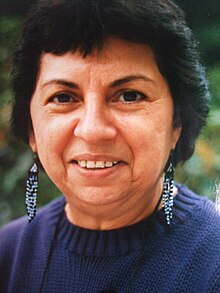This Bridge Called My Back
Appearance

This Bridge Called My Back: Writings by Radical Women of Color is a feminist anthology edited by Cherríe Moraga and Gloria E. Anzaldúa first published in 1981 by Persephone Press.
Quotes
- Page numbers refer to the Fourth Edition (SUNY Press: 2015)
- Grassroots feminists continue to be undermined by single-issue liberals who believe that by breaking a class-entitled glass ceiling—'beating the boys at their own game'—there is some kind of "trickle down" effect on the actual lives of workingclass and poor women and children. This is the same "trickle down" of our share of corporate profit, secured by tax benefits for the wealthy, that has yet to land on our kitchen tables, our paychecks, or our children's public school educations. Social change does not occur through tokenism or exceptions to the rule of discrimination, but through the systemic abolishment of the rule itself.
- Cherríe Moraga, "Catching Fire: Preface to the Fourth Edition," p. xvii
- It is inappropriate for progressive or liberal white people to expect warriors in brown armor to eradicate racism. There must be co-responsibility from people of color and white people to equally work on this issue.
- Barbara Cameron, "Gee, You Don't Seem Like An Indian," p. 46
- For a woman to be a lesbian in a male-supremacist, capitalist, misogynist, racist, homophobic, imperialist culture, such at that of North America, is an act of resistance.
- Cheryl Clarke, "Lesbianism: An Act of Resistance," p. 126
- Why am I compelled to write? Because the writing saves me from this complacency I fear. Because I have no choice. Because I must keep the spirit of my revolt and myself alive. Because the world I create in the writing compensates for what the real world does not give me. By writing I put order in the world, give it a handle so I can grasp it. I write because life does not appease my appetites and hunger. I write to record what others erase when I speak, to rewrite the stories others have miswritten about me, about you.
- Gloria E. Anzaldúa, "Speaking in Tongues: A Letter to Third World Women Writers," p. 166

